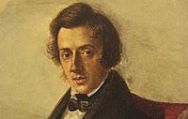But you’re also looking at a man who has a great appreciation for musical innovation, as well.

Zorn has been playing the piano since he was 5 years old, and continues to do so to this day. His passion for classical piano literature has even led him to travel internationally to hear live performances. He heard Vladimir Horowitz in 1982 in London, for instance, and Arthur Rubinstein several times in Strasbourg.
His favorite piano compositions are Chopin’s 24 Etudes (Opus 10 and Opus 25). These studies are generally considered – to quote Wikipedia – “some of the most challenging and evocative pieces of all the works in the concert piano repertoire.”
It has often been noted that music uses mathematical logic to achieve pleasing rhythms and harmonies. But that doesn’t totally explain the composition of such works as the Etudes. Such creativity remains a tantalizing mystery.
“For me the greatest musical geniuses –Bach, Mozart, Chopin, Mendelssohn, Liszt, Beethoven, Schubert, Gershwin – all were inspired by incredible sources from somewhere above,” Zorn wrote in a recent email.
In 1986 he began to write down his thoughts under the working title, “Musik und Informatik – ein Brueckenschlag” (“Music and Informatics – An Attempt at Bridging”). It was 167 pages long when, busy with his careers in teaching and networking, he suspended writing it. But he may yet get back to it, as he still believes there is a profound connection between the two fields.
“The works of the genius composers are so complex that the problem of how these structures with all their inner relations can be adequately described can easily be considered as a ‘systems analysis’ task,” he says.
“For a while, I was really thinking of studying music. But thank God I decided in favor of engineering and to keep music as just a hobby.”
That leaves the rest of us though, to look forward to reading his “Brueckenschlag” and to wonder what ethereal compositions might have been created during the musical career of Internet Hall of Famer Werner Zorn.
Written by the Internet Hall of Fame editorial staff